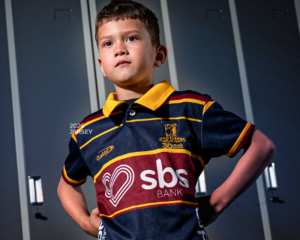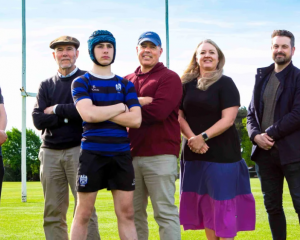New Zealand's national sport has been lambasted as a sexist institution and the "last bastion of chauvinism" after a report found women were excluded from decision-making at all levels of the game.
The NZRU has never had a female voice at the boardroom table, while of 194 board positions at provincial level, just five (two of which are on the Auckland Rugby Board) are taken by women.
The glaring imbalance prompted Dr Judy McGregor, in her former role at the Human Rights Commission, to launch a campaign late last year pushing for the inclusion of a female representative on the NZRU board.
Asked if rugby was an inherently sexist establishment, Dr McGregor replied: "Absolutely. The figures show it. When you have absolutely no women involved in the decision-making ... despite the fact women hold many rugby clubs together, it shows there is a big problem. I honestly can't believe it - the numbers are deplorable."
McGregor, who authored the 2012 census report into women's participation, found that generally national sporting organisations are getting their act together when it comes to female representation on boards.
Data gathered over the past decade shows the number of sports that have women in governance positions is slowly but surely improving.
But rugby is one of three "recalcitrant sports" - the other two being shooting and curling - that do not have any females on their national board.
Given the profile rugby enjoys in this country, McGregor said she felt compelled to single out the NZRU.
"Sports governance is a critical area for female representation - given its significance to our national identity, rugby should be a leader, not the last bastion of chauvinism.
"I think at all levels there needs to be reform and change."
The criticism of the NZRU comes when many sporting organisations are making a point of ensuring women are more visible in their game. In Australia, the NRL has an annual "women in league" round aimed at celebrating the achievements and growth of female involvement in their sport, while at the same time encouraging those in the game to push even harder to break new barriers.
The initiative has helped improve the competition's image from that of being a blokey sport rife with misogyny, to one which is more inclusive - although the ploy will continue to look like tokenism while unsavoury incidents involving some of the game's stars and women continue.
Former Black Fern Louisa Wall said the NZRU has been slow to recognise the value female leaders can bring to their game.
"Women are a huge contributor to rugby in New Zealand. It's not just the playing base, but it's the business of rugby. There were just as many women at the Rugby World Cup final as men," said Wall, Labour's spokeswoman for sport and recreation.
"The NZRU don't seem to have caught up with the fact that women watch rugby, they play the game, they buy All Blacks jerseys - it's our national sport."
Wall has twice put her name forward for top rugby governance positions.
She applied for one of the independent seats on the NZRU board, and more recently tried for a position on the Blues board - "I didn't even get an interview for the Blues board, it's such an old boys' network."
As director on the Maori Rugby board, Wall's former teammate, Farah Palmer, is one of the few women that have any say in the strategic direction of the game. Palmer said the way rugby's constitution is structured, the only avenue females have of forcing their way into the NZRU boardroom is through their two independent seats.
"It's very difficult for women to get on to the [national] board, because you have to be on a provincial rugby union board, and then you have to be nominated by predominantly men who have been involved in rugby and know one another from their playing days.
"So the pathways to get on to those boards is limiting for women," said Palmer.
Since 2007, the NZRU has sought applications for five independent directorship terms but despite receiving 24 applications from women over that time, none were successful.
NZRU chairman Mike Eagle was unavailable for an interview for the series, but in a statement he acknowledged the fact they had no gender diversity on the board "is an issue for us".
Eagle said the profile of the women's game was increasing with the inclusion of sevens rugby in the Olympic programme, which he believed would lead to more women putting their hands up for leadership roles.
"As participation increases, we hope, and expect, more women will want to be involved off the field, including in governance roles, as has happened with other sports," he said.
McGregor believes the NZRU needs to follow the lead from league and cricket and be more proactive about involving women.
It was not enough for the NZRU to change its constitution to allow for greater diversity if it was not going to result in any real change.
"Contemporary organisations have contemporary boards, and if you continue to have an entirely all-male rugby board, that is saying something to the world."
- Dana Johannsen of the New Zealand Herald













